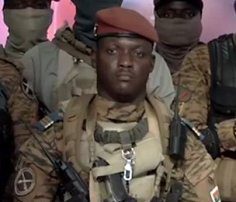Western countries are determined to erect proverbial roadblocks aimed at stopping Wagner, the Russian private military firm from being close to the junta in jihadist-infested Burkina Faso.
Will Ouagadougou call on the Russians to defeat the jihadists? Not likely, according to the US Under Secretary of State for Political Affairs.
At the end of a visit to Burkina Faso on October 20 as part of a tour that also took her to Mauritania and Niger, Victoria Nuland said she had discussed the matter with Captain Ibrahim Traoré, who was sworn in as president of the transition after his September 30 coup against Lieutenant-Colonel Paul-Henri Damiba.
“Captain Traore has no intention of calling on Wagner,” the US diplomat told an online press conference.
On the eve of her meeting with the Burkinabe head of state, the European Parliament had advised “the Burkinabe authorities not to resort to the Wagner group to train their army or achieve stability,” expressing its concern about “the activities of the Russian group in the Sahel region.”
According to the European Parliament resolution adopted on 14 October and consulted by APA, “a group of Russian companies has written to the coup leaders in Burkina Faso to propose to train the army in the fight against terrorism,” recalling that “the use of private military companies such as the Wagner Group goes against the objective of bringing peace, security and stability to Burkina Faso and the Sahel.”
This pressure exerted by Western countries on the new authorities in Ouagadougou seems to be motivated by a desire to avoid the reproduction of the Malian model in its southern neighbour.
With the withdrawal of the French Barkhane force from their country after nearly a decade of war against the jihadists, the military that has governed Mali since May 2021, nine months after a first coup against Ibrahim Boubacar Keita, has resorted to Russian “instructors” or “mercenaries” to reverse the fortunes in the fight against Islamist insurgents affiliated with Al Qaeda or the Islamic State.
However, for the US Under Secretary of State, Wagner’s activities in Mali have contributed to the deterioration of the security situation in the West African country.
These warnings from Burkina Faso’s Western partners did not prevent Captain Traoré from making his first trip to Mali.
At the end of his few-hour stay, the junior officer said he had discussed with Colonel Assimi Goita “how to strengthen military cooperation and how to protect the populations” of their countries, noting “the most important thing is the security challenge” facing the two states that share more than 1,000 kilometres of borders.
However, not a single word was devoted to the Wagner option, which has no shortage of support in his country.
Pointing out that Burkina Faso has already been in partnership with Russia since the 1960s, the Prime Minister of the transition, Mr. Apollinaire Jean Kyelem de Tambela, recalled in his first speech that there was no question of his country “allowing itself to be dominated by any partner.”
“We will negotiate with all partners, keeping in mind the interests of Burkina Faso first. If we feel that a partner is not being fair to us, we will bring it to their attention. If they persist in their behaviour, we will review our relations with that partner. This must be clear to everyone,” he said.
On October 20, his boss assured Victoria Nuland that “only the Burkinabe will defend their country.”
This strategy is materialised by a vast recruitment campaign of more than 3,000 soldiers and 50,000 Volunteers for the Defence of the Fatherland (VDP).
But until when, especially since jihadist attacks, which are at the origin of two coups in Burkina Faso in less than a year, continue to grow in the north and east of the country.
AC/lb/as/APA


